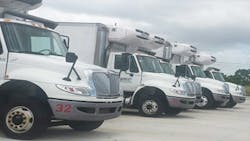Courses address mandatory training as part of FSMA
Final rules on the Sanitary Transportation of Human and Animal Foods—part of the Food Safety Modernization Act (FSMA)—establish training requirements for all carrier personnel engaged in food transportation operations. Training certificates are required for these topics:
•Responsibilities of the carrier under the final rules
•Awareness of potential food safety problems that may occur during food transportation
•Basic sanitary transportation practices to address those potential problems
This training is required for all personnel engaged in transportation operations upon hiring and as needed thereafter.
More than 84,000 food shippers, carriers, and receivers are impacted by this new law, and most have less than one year for full compliance.
The US Food and Drug Administration (FDA) defines a carrier as a “person who owns, leases, or is otherwise ultimately responsible for the use of a motor vehicle or rail vehicle to transport food. The carrier is responsible for all functions assigned to a carrier in this subpart even if they are performed by other persons, such as a driver that is employed or contracted by a trucking firm. A carrier may also be a receiver or a shipper if the person also performs the functions of those respective persons as defined in this subpart.”
The FDA website has documented key changes in the FSMA rule that have been implemented since the rule was proposed in 2014. According to this document:
The definition of “transportation operations” has been changed to exclude:
•Transport of foods completely enclosed by a container (except for food that requires temperature control). The original proposal specified that the enclosed foods must be shelf-stable (safely stored at room temperature in a sealed container).
•All transportation activities performed by a farm. Under the proposed rule, only the transportation of foods that are raw agricultural commodities would have been excluded.
The diversity of farms and their transportation operations make it difficult to develop regulations that would be broadly suitable. Instead, the FDA is considering providing guidance on good farm transportation practices.
Required training consists of these three courses:
•Responsibilities of the Carrier Under the Final Rules (1 hour). Session 1 covers final rules on the Sanitary Transportation of Human and Animal Foods (now law) as published by the FDA under the FSMA.
•Awareness of Potential Food Safety Problems That May Occur During Transportation (1 hour). This session covers bacteria, chemical and physical hazards, preventive control of hazards that can impact food during food load, unload and transportation operations; prevention versus corrective action, misuse of disinfectants and sanitizers, not cleaning bins, trays, pallets and other tools and equipment used in carrier operations, cross-contamination, employee personnel hygiene, temperature variation; vehicle, container and trailer traceability and reporting systems, reefer failures, lack of container maintenance, improper or missing container security systems, accidents, and recalls.
•Basic Sanitary Transportation Practices to Address Food Transportation Sanitation Problems (1.5 hours). The course includes contracts of carriage and agreements; system assessment strategy; flowcharting operations, establishing critical parameters and measurement; standards for management, validation of preventive controls, sanitation, temperature monitoring and container (vehicles, trailers, and shipping containers), traceability and training; procedures, recordkeeping and retention; audit and certification, training, wash, ATP and bacteria testing, inspection and re-inspection requirements, calibration, MSDS, statistical analysis and records retention.
All of these training sessions are prerecorded. Each course is a Powerpoint lecture delivered to your site for use as required by your schedules.
Cost for all three courses is $69 per trainee. Certificates are delivered for each trainee when the course is completed. Access www.SanitaryColdChain.com to learn more.
To order this training, have your credit card ready and go to this link.
Download the presentation and go through each of the three sessions on your own schedule.
Email [email protected] or phone 808-469-0046 for more information.
